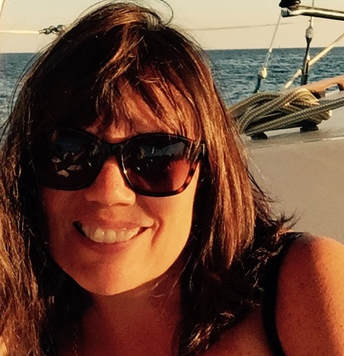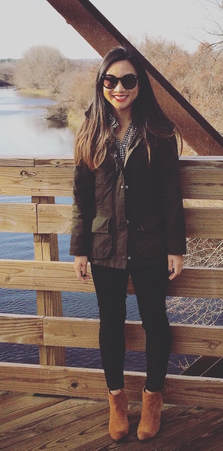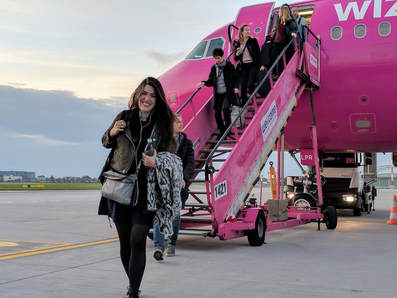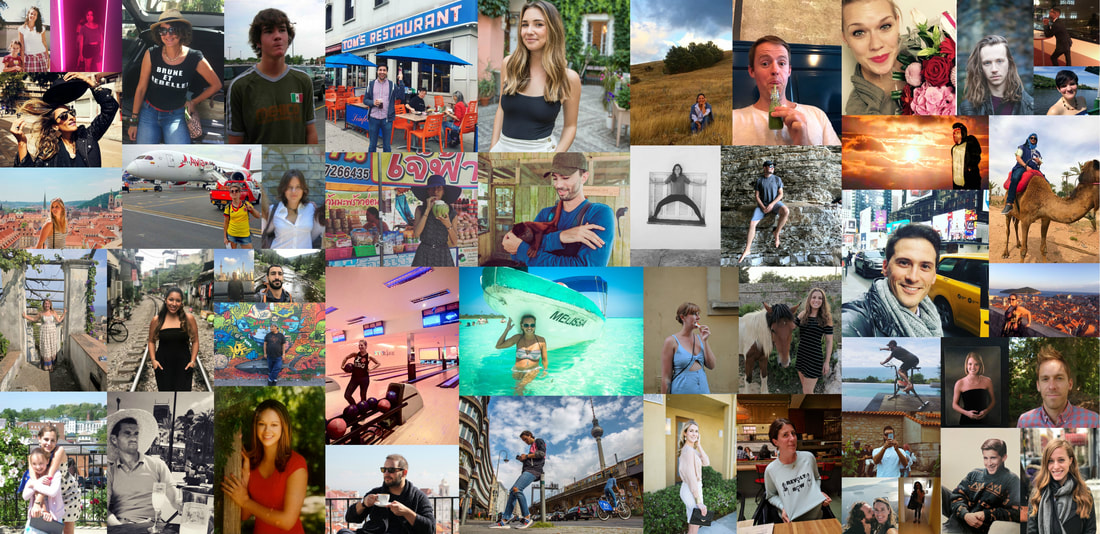 Susan Robinson is a fashion designer, currently running Bee Fearless, a girls’ hockey clothing company she founded. She’s also my aunt and my number one style icon. Growing up, Susan was very much my model for what it meant to be a successful young professional, living in New York City, traveling to Europe and Asia on business, and always being flawlessly accessorized. It was a real pleasure to get to see behind the curtain, and learn how she made all of that happen. Our conversation has been edited for length and clarity. When you were 17, what did you want to be? I think I saw myself in the fashion industry. I was into art, and I was very interested in fashion, but not so much interested in designing. I’d always liked clothes, and I liked to put things together. I'd heard about being a fashion buyer from someone and I thought that seemed like a pretty fancy job. And I think a lot of it had to do with wanting to get out of Mansfield, Ohio, and that seemed like a good ticket.
2 Comments
 Joyce Kim is a technology analyst and consultant specializing in higher ed. I met Joyce almost a decade ago when we studied for our master’s degrees together at Boston University, and I credit her with teaching me everything I know about Texas (her home state) and William Faulkner (her dissertation topic). Most of all, I’ve always admired Joyce’s eclectic taste, and how she somehow manages to apply the same level of insight to literary theory as to internet memes. Our conversation has been edited for length and clarity. When you were 17, what did you want to be? I think I always saw myself as a writer. Not necessarily a writer of novels - I was never a kid that wrote stories - but maybe a journalist or something. I always knew writing was something I was really good at and very interested in, and I loved reading. I read a lot of Agatha Christie, which probably explains why I have a macabre sensibility now. But at 11 or 12 years old, I read every single Agatha Christie at the library. I was very into Gone With The Wind as a child, which, I'm very proud because I managed to sandwich that into my dissertation. I just really liked the idea of being able to talk to people and tell people’s stories, which is indirectly what I do now.  Megan McHugh is a copywriter at Kronos, an English professor at Bunker Hill Community College, and a freelance writer. Megan and I first met across the seminar table in graduate school, and our friendship has basically been a 9 year-long conversation on feminism, poetry, and what it means to be your most authentic self. That same spirit carried through seamlessly when I interviewed her about her career path. Our conversation has been edited for length and clarity. When you were 17, what did you want to be? I wanted to be a professional hippie. I wanted to perfect the art of meditating and maybe gardening, but that almost sounds too ambitious, too active. At the time, I had a boyfriend who was very precious to me, and he and his family were everything that my family wasn't. They were happy and complicated in a very transparent, appealing way, and they lived in this house that was covered in art, and it was all so refreshing. His mom kept this fairy tale garden in the backyard that was just stonework and ponds and fountains, and there were turtles, and chives that we ate. We sat around in this really beautiful space together, and I just saw myself wanting to do that for a very long time. One year ago this week, I published my first post in the “When I Was 17” series. One year ago, I was in Rabat, Morocco on the fourth month of my year of travel. I was interviewing my fellow travelers in a Berber tent on the roof of our coworking space, in sidewalk cafes, and in the center of our riad. Today, I’m in Austin, Texas, sitting on my friend’s couch, watching her 7-month-old baby figure out how to crawl. It’s completely different, but somehow still delightfully unpredictable. In the year since I started posting these interviews, I have lived in 14 different cities, 12 different countries, and on five different continents, and I’ve interviewed subjects from almost as many places. During my year of travel, I loved that this series gave me permission to reach out to people I didn’t know very well, spend some time with them one-on-one, and hear stories that I wouldn’t normally be privy to so early in a friendship. Since I’ve returned home, “When I Was 17” has enabled me to reconnect with people from my past, and hear how the last 5, 10, 15 years of their lives have unfolded. It has given me access to parts of my friends’ and family’s lives I never knew before. And most of all, it has given me 48 new examples to point to when I hear a student worry that they don’t know what they want to do with their lives. When I started interviewing people, I had this hypothesis that despite our cultural predilection for asking children and teenagers what they want to be when they grow up, most people don’t know what they want to do, and if they do, there’s a very high chance that it will change. That idea has been borne out over and over again as I’ve gathered people’s stories. People change majors, change careers, and change jobs numerous times over the decades that they end up working. But I’ve also noticed that because my interviewees are the people I happen to know, they have a lot in common with me and each other. They are people I went to graduate school with who also love to read and write, people I did theater with in high school, people who work remotely and love to travel, young people at the beginnings of their careers, people who went to college and view education as a lifelong pursuit. For the next year of this project, I’d like to broaden the conversations I’m having. That’s where you come in. I’d like to ask you to connect me with your circles, to introduce me to the people in your life whose stories would be an interesting addition to this project. Sometimes before an interview, my subject will tell me that they might not be a good fit for this series because they didn’t go to college, or because they actually knew what they wanted to be when they grew up and then did it. But there are no good and bad subjects. My intention is to learn how as many people as possible got where they are. For the past year, people have been asking me what I’m going to do with this series. Will I turn it into a book, or a podcast, or a YouTube channel? The truth is, I don’t know. For now, I’m just enjoying having the opportunity to talk to interesting people and hear their stories. But ask me again in a year. |
What is the When I Was 17 Project?When I Was 17 is a blog series dedicated to collecting the varied stories of people's career paths, what they envisioned themselves doing when they were teenagers and how that evolved over the course of their lives. I started this project with the goal of illustrating that it's okay not to know exactly what you want to do when you're 17; many successful people didn't, and these are a few of their stories.
Archives
October 2020
|
